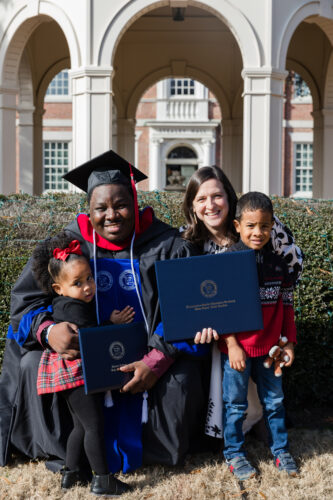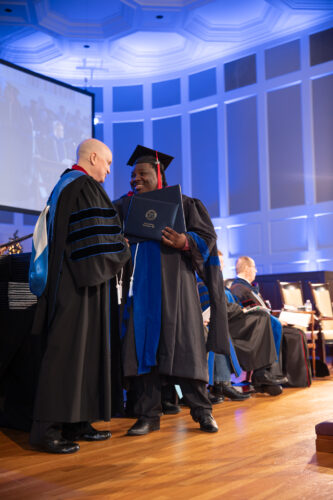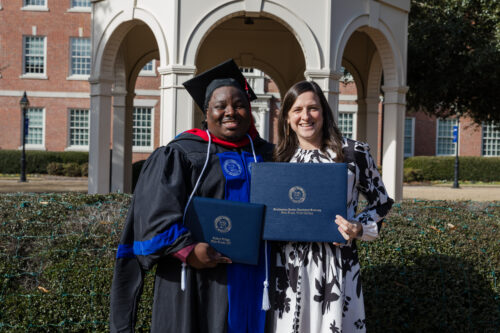Graduate Spotlight: A Conversation with Raven Fox
Mary Asta Mountain | December 20, 2024

This past Friday, Raven Fox graduated from Judson College and Southeastern Seminary after completing the 5-year Christian counseling program and earning both a Bachelor of Arts in Christian counseling and a Master of Arts in Christian marital, family, and individual counseling. During his time at Judson, Raven has grown as a scholar, as a counselor, and as a follower of Christ with the desire to clearly communicate the truth of the gospel as he ministers to those in need of healing and hope.
1. Why did you choose to study at Judson College?
Choosing Judson was initially a choice of convenience. My wife was urging me to go back to school after I had considered a career change, and our close friend suggested that I enroll in one of Judson’s certificate programs to see if it was for me. After I completed the certificate, my wife and I decided to take the full plunge into school. Since I have no formal liberal arts training it made sense to start as an undergraduate to give me that foundation of learning and to teach me how to write, research, and think in a non-STEM way. As a member of The Summit Church, I understood the mission of the school and its heart for missions, which ultimately made Judson a satisfying choice.
suggested that I enroll in one of Judson’s certificate programs to see if it was for me. After I completed the certificate, my wife and I decided to take the full plunge into school. Since I have no formal liberal arts training it made sense to start as an undergraduate to give me that foundation of learning and to teach me how to write, research, and think in a non-STEM way. As a member of The Summit Church, I understood the mission of the school and its heart for missions, which ultimately made Judson a satisfying choice.
2. What aspects of your education at Judson were particularly formative or encouraging to you?
Learning how to write was critical for me, as it was my biggest challenge going into school. Coming from an A+B=C environment, it was hard at first to approach certain subjects and papers since sharing my thoughts in a coherent way, frankly, hasn’t always been natural to me. Studying history, worldviews, and philosophers both inside and outside of the church has helped me immensely, teaching me how to interact with the world around me and eloquently communicate my place and views in it. Perhaps the most encouraging thing about my education here is that the professors care for me and my family. I was not expecting to be treated as a beloved brother and cherished student, but time after time, class after class, it was clear that every one of my professors truly wanted the best for me regardless of the subject matter they taught.
I was not expecting to be treated as a beloved brother and cherished student, but time after time, class after class, it was clear that every one of my professors truly wanted the best for me regardless of the subject matter they taught.
3. How did your time studying at Judson shape your view of the Great Commission?
Judson really showed me the importance of the Great Commission across all endeavors. I was able to see the call of the gospel in each context, communicated intentionally without trying to also impose our culture on others. How refreshing it was!
4. Which classes, professors, or memories stand out to you the most?
There are a lot of good ones, but I’ll narrow down a few. Public speaking with Dr. Miles was one of my favorite classes not only because she was a fellow Wolfpacker but also because she was able to articulate what it means to think critically with clarity in the liberal arts space. Neuroscience was a fantastic class because my teacher  was able to blend the truth of the gospel with what happens in the brain and show the congruency between the two.
was able to blend the truth of the gospel with what happens in the brain and show the congruency between the two.
Dr. Hambrick is a kindred spirit who has a plan for everything and cares deeply for the church and its proper handling of counseling. He imparted the reality that souls are often at stake, and we must treat them with care and high concern. Dr. Van Dyck is an amazing professor and clinician who openly shared his own personal journey and helped me navigate how to use my voice and trust my training when helping clients. He is an expert in his field, and studying under him was truly a joy.
A core memory of my time at Judson is definitely going through the practicum with my peers and our supervisor Sharon Sheppard. My confidence as a clinician can be directly tied to her encouragement and critiques. And last but certainly not least, Dr. Kellen showed me how a professor cares for her students. When I was first diagnosed with ADHD and depressive episodes, she was there to encourage and support me as I tried to get my feet back under me and work through it. Not only that but every peer I’ve studied with has had similar experiences, and she truly makes Southeastern feel like a family in which she is the house mother.
5. How have you seen theological education go hand in hand with ministry preparation during your time as a student?
I don’t mean to sound corny, but the marriage of theological education and ministry preparation is the ‘modus operandi’ here. Every single class, from neuroscience to psychopathology, had a firm foundation of gospel truths and principles undergirding each topic we talked about. The gospel speaks to everything and has proven itself time and time again as the benchmark and benefit for all things good and holy. This principle was shared by each professor I had, and they helped me think through each topic with a gospel lens.
Every single class, from neuroscience to psychopathology, had a firm foundation of gospel truths and principles undergirding each topic we talked about.
6. How do you hope to use your degree, and where do you hope to serve now that you have graduated?
Immediately upon graduating, I hope to sit for the state licensure exam. I feel called to continue serving the church in my current capacity while stepping into therapy and counseling part-time to start. The dream for me and my wife (who is a school counselor) is that further down the line we can open up a family counseling practice.
therapy and counseling part-time to start. The dream for me and my wife (who is a school counselor) is that further down the line we can open up a family counseling practice.
7. How can your Southeastern family be praying for you?
Pray that the Lord grants me clear vision for whatever it is he wants me to do, and pray for my counseling space to be a place of healing, growth, and most importantly a lamplighter that leads people towards the healing and caring arms of Christ that we are all desperately yearning for.
